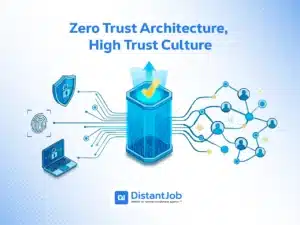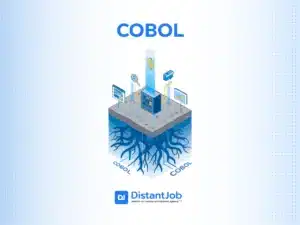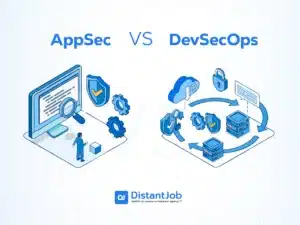Hiring managers used to choose between broad talent and deep expertise: full-stack developers handle both front- and back-end work, while specialists focus on one area of the tech stack like React, ultra-fast APIs, or mobile. But in the last two years, that trade-off has started to change. Why?
Because Python has overtaken JavaScript in use on GitHub , pointing to a growth in data/AI workloads that demand different skills, AI pair programming tools can now reduce time spent on boilerplate code by about 55 % for both generalists and specialists, and by 2026, 80 % of large companies will have platform engineering teams to formalize the interfaces between platform and application layers .
That means the choice is no longer full-stack developer OR specialist; it’s finding the right combination of full-stack and specialized developers, leveraged by AI tools and platform teams, that enables engineers to focus on what they do best.
Let’s explore the differences between both roles in more depth, and then you can decide what to choose.
What is a Full-Stack Developer?
Full-stack developers are seen as generalists, with skills and knowledge from front-end (client) through to back-end and infrastructure (server). They are developers who can pick up and work on any part of the software. They can build end-to-end features.
A full-stack developer is still a developer who can deliver a feature end-to-end or work “from pixel to persistence”. However, the best full- stack developers now have more depth in at least one layer of a stack and are known as T-shaped.
Key Responsibilities:
- Frontend development: The visible part of the software, UI/UX (JavaScript, HTML5, CSS3, React JS, Angular).
- Backend development: The server-side of the web/software application, including infrastructure. (Java, Python, Ruby, PHP, Node.js with Express, or NestJS).
- Database: Building databases such as Oracle, SQLServer, and MySQL, and working with cache technologies.
- APIs: Creating application interfaces.
- Implement and maintain: Deploying the system, maintaining, and updating after going live.
- Serverless & Edge
What Is a Specialized Developer?
Specialized developers are experienced developers who excel in specific areas of the stack. They are focused on a specific skill set and work on one area of the software, which could be either front-end, back-end, or mobile.
They usually specialize in specific frameworks (e.g. SvelteKit, Rust Actix, Apache Iceberg), lead code reviews, performance optimizations, and work with platform engineering teams to open the services.
Primary Responsibilities:
- Front-end developers: Responsible for the design and layout of a website or web application.
- Back-end developers Work on the server side of a web application and everything that communicates between the database and the browser.
- Other types of specialized developers: Mobile developers, DevOps, QA, and many others.
Full-Stack vs. Specialized Developers: Key Differences
The difference between a full-stack and specialized developer is that a full-stack developer can implement a feature end-to-end from front-end (UI) to back-end (server, database) while the specialized developer enhances a feature in one layer of an application, UI, back-end API layer, or mobile (e.g., develop a mobile application). Here’s a side-by-side table comparison of their roles:
Skills & Responsibilities Comparison
| Full Stack Developer | Specialized Developer |
| Must understand both front-end and back-end technologies. | Depth of expertise in a single domain (e.g., frontend, backend, mobile) |
| End-to-end development of an application | Focused on specific components or layers of an application |
| Generalist, proficient in multiple technologies | Expert, deep knowledge in a particular skill or technology |
| Ideal for startups, MVPs, or projects with flexible requirements | Best for big companies, complex projects with fixed requirements, or high-investment projects |
| Generally more cost-effective than hiring multiple specialists | Typically higher labor costs when building a full team |
| Full-stack devs benefit most from AI code completion (55 % speed boost) | Specialists use AI for test generation and static analysis at depth. |
| Easier to manage as a single, cohesive unit | Requires coordination between different specialized teams |
Salary Comparison
| Role | Total pay |
|---|---|
| Full-Stack Developer | $118,110 / yr (base: $96,114) |
| Back-End Developer | $100,678 / yr (≈ $57.73 / hr) |
Pros and Cons of Each Role
| Full-Stack | Specialized | |
|---|---|---|
| Speed to MVP | ⭐⭐⭐⭐ | ⭐⭐ |
| Maintenance at Scale | ⭐⭐ | ⭐⭐⭐⭐ |
| Hiring Cost | Lower | Higher |
| Career Growth | Generalist → Staff Engineer | Domain Principal → Architect |
| Risk Mitigation | Single point of failure | Team redundancy |
Which one is better to get started?
Short answer: whatever floats your boat.
Long answer: usually Full-Stack devs get a bigger salary, even if, by the time of this article, back-end developers are earning more money.
Full-stack developers were actually the first to come to the world. Specialized roles emerged when they created the definition of back and front ends. Therefore, there is no truly balanced full-stack developer; someone always prefers one over another or develops more skills in a certain end.
So, I would start full-stack, just to be aware of how the software works as a whole, knowing its whole lifecycle. Then, I would gravitate towards one of my choices or just stay full-stack. No time would be wasted, since the more I know about both ends, the better.
FAQ
Yes—“Full-Stack Developer” remains a top-five job title on Stack Overflow’s 2024 survey
JavaScript / TypeScript, Python, Go or Rust for back-end, plus bash and IaC (Terraform/Pulumi). Python’s GitHub rise proves data work matters.
No, AI speeds routine coding but increases demand for deep reviewers and security experts
They decouple infra skills from feature teams, so you can staff leaner full-stack squads and a smaller pool of infra specialists.





